HLTH 1037: Mental Health Supplementary Assessment - ISBAR Handover
VerifiedAdded on 2022/08/20
|6
|2079
|10
Practical Assignment
AI Summary
This document presents a comprehensive ISBAR (Identify, Situation, Background, Assessment, Recommendation) clinical handover scenario for a 21-year-old male student, Andy, diagnosed with schizophrenia. The handover, written from the perspective of a Registered Nurse, details the patient's presentation, including symptoms like persecutory delusions, auditory hallucinations, and thought insertion, alongside his history, current living situation, and medication use. The situation highlights the referral from his GP due to mental health concerns, with stressors including academic pressure and social isolation. The background provides developmental, psychiatric, drug use, and family history. The assessment includes a mental state examination and risk issues like suicidal ideation and self-harm. Recommendations involve timely medication, establishing trust, monitoring symptoms, and implementing multidisciplinary interventions. The document also references relevant research and nursing care guidelines to support the provided information. This is a detailed account of a patient's condition and the nursing care plan, designed to facilitate a smooth transition of care between shifts.
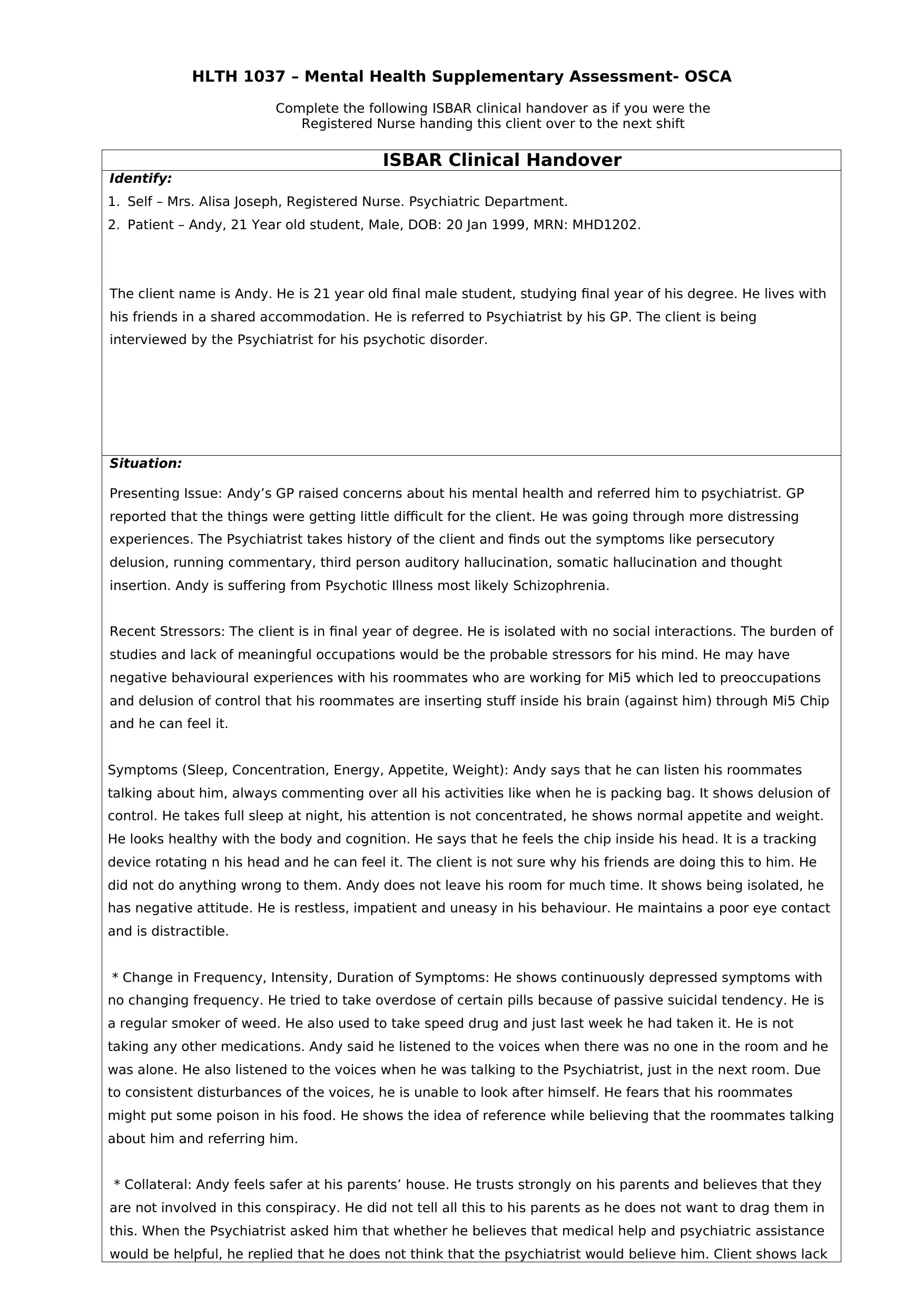
HLTH 1037 – Mental Health Supplementary Assessment- OSCA
Complete the following ISBAR clinical handover as if you were the
Registered Nurse handing this client over to the next shift
ISBAR Clinical Handover
Identify:
1. Self – Mrs. Alisa Joseph, Registered Nurse. Psychiatric Department.
2. Patient – Andy, 21 Year old student, Male, DOB: 20 Jan 1999, MRN: MHD1202.
The client name is Andy. He is 21 year old final male student, studying final year of his degree. He lives with
his friends in a shared accommodation. He is referred to Psychiatrist by his GP. The client is being
interviewed by the Psychiatrist for his psychotic disorder.
Situation:
Presenting Issue: Andy’s GP raised concerns about his mental health and referred him to psychiatrist. GP
reported that the things were getting little difficult for the client. He was going through more distressing
experiences. The Psychiatrist takes history of the client and finds out the symptoms like persecutory
delusion, running commentary, third person auditory hallucination, somatic hallucination and thought
insertion. Andy is suffering from Psychotic Illness most likely Schizophrenia.
Recent Stressors: The client is in final year of degree. He is isolated with no social interactions. The burden of
studies and lack of meaningful occupations would be the probable stressors for his mind. He may have
negative behavioural experiences with his roommates who are working for Mi5 which led to preoccupations
and delusion of control that his roommates are inserting stuff inside his brain (against him) through Mi5 Chip
and he can feel it.
Symptoms (Sleep, Concentration, Energy, Appetite, Weight): Andy says that he can listen his roommates
talking about him, always commenting over all his activities like when he is packing bag. It shows delusion of
control. He takes full sleep at night, his attention is not concentrated, he shows normal appetite and weight.
He looks healthy with the body and cognition. He says that he feels the chip inside his head. It is a tracking
device rotating n his head and he can feel it. The client is not sure why his friends are doing this to him. He
did not do anything wrong to them. Andy does not leave his room for much time. It shows being isolated, he
has negative attitude. He is restless, impatient and uneasy in his behaviour. He maintains a poor eye contact
and is distractible.
* Change in Frequency, Intensity, Duration of Symptoms: He shows continuously depressed symptoms with
no changing frequency. He tried to take overdose of certain pills because of passive suicidal tendency. He is
a regular smoker of weed. He also used to take speed drug and just last week he had taken it. He is not
taking any other medications. Andy said he listened to the voices when there was no one in the room and he
was alone. He also listened to the voices when he was talking to the Psychiatrist, just in the next room. Due
to consistent disturbances of the voices, he is unable to look after himself. He fears that his roommates
might put some poison in his food. He shows the idea of reference while believing that the roommates talking
about him and referring him.
* Collateral: Andy feels safer at his parents’ house. He trusts strongly on his parents and believes that they
are not involved in this conspiracy. He did not tell all this to his parents as he does not want to drag them in
this. When the Psychiatrist asked him that whether he believes that medical help and psychiatric assistance
would be helpful, he replied that he does not think that the psychiatrist would believe him. Client shows lack
Complete the following ISBAR clinical handover as if you were the
Registered Nurse handing this client over to the next shift
ISBAR Clinical Handover
Identify:
1. Self – Mrs. Alisa Joseph, Registered Nurse. Psychiatric Department.
2. Patient – Andy, 21 Year old student, Male, DOB: 20 Jan 1999, MRN: MHD1202.
The client name is Andy. He is 21 year old final male student, studying final year of his degree. He lives with
his friends in a shared accommodation. He is referred to Psychiatrist by his GP. The client is being
interviewed by the Psychiatrist for his psychotic disorder.
Situation:
Presenting Issue: Andy’s GP raised concerns about his mental health and referred him to psychiatrist. GP
reported that the things were getting little difficult for the client. He was going through more distressing
experiences. The Psychiatrist takes history of the client and finds out the symptoms like persecutory
delusion, running commentary, third person auditory hallucination, somatic hallucination and thought
insertion. Andy is suffering from Psychotic Illness most likely Schizophrenia.
Recent Stressors: The client is in final year of degree. He is isolated with no social interactions. The burden of
studies and lack of meaningful occupations would be the probable stressors for his mind. He may have
negative behavioural experiences with his roommates who are working for Mi5 which led to preoccupations
and delusion of control that his roommates are inserting stuff inside his brain (against him) through Mi5 Chip
and he can feel it.
Symptoms (Sleep, Concentration, Energy, Appetite, Weight): Andy says that he can listen his roommates
talking about him, always commenting over all his activities like when he is packing bag. It shows delusion of
control. He takes full sleep at night, his attention is not concentrated, he shows normal appetite and weight.
He looks healthy with the body and cognition. He says that he feels the chip inside his head. It is a tracking
device rotating n his head and he can feel it. The client is not sure why his friends are doing this to him. He
did not do anything wrong to them. Andy does not leave his room for much time. It shows being isolated, he
has negative attitude. He is restless, impatient and uneasy in his behaviour. He maintains a poor eye contact
and is distractible.
* Change in Frequency, Intensity, Duration of Symptoms: He shows continuously depressed symptoms with
no changing frequency. He tried to take overdose of certain pills because of passive suicidal tendency. He is
a regular smoker of weed. He also used to take speed drug and just last week he had taken it. He is not
taking any other medications. Andy said he listened to the voices when there was no one in the room and he
was alone. He also listened to the voices when he was talking to the Psychiatrist, just in the next room. Due
to consistent disturbances of the voices, he is unable to look after himself. He fears that his roommates
might put some poison in his food. He shows the idea of reference while believing that the roommates talking
about him and referring him.
* Collateral: Andy feels safer at his parents’ house. He trusts strongly on his parents and believes that they
are not involved in this conspiracy. He did not tell all this to his parents as he does not want to drag them in
this. When the Psychiatrist asked him that whether he believes that medical help and psychiatric assistance
would be helpful, he replied that he does not think that the psychiatrist would believe him. Client shows lack
Paraphrase This Document
Need a fresh take? Get an instant paraphrase of this document with our AI Paraphraser
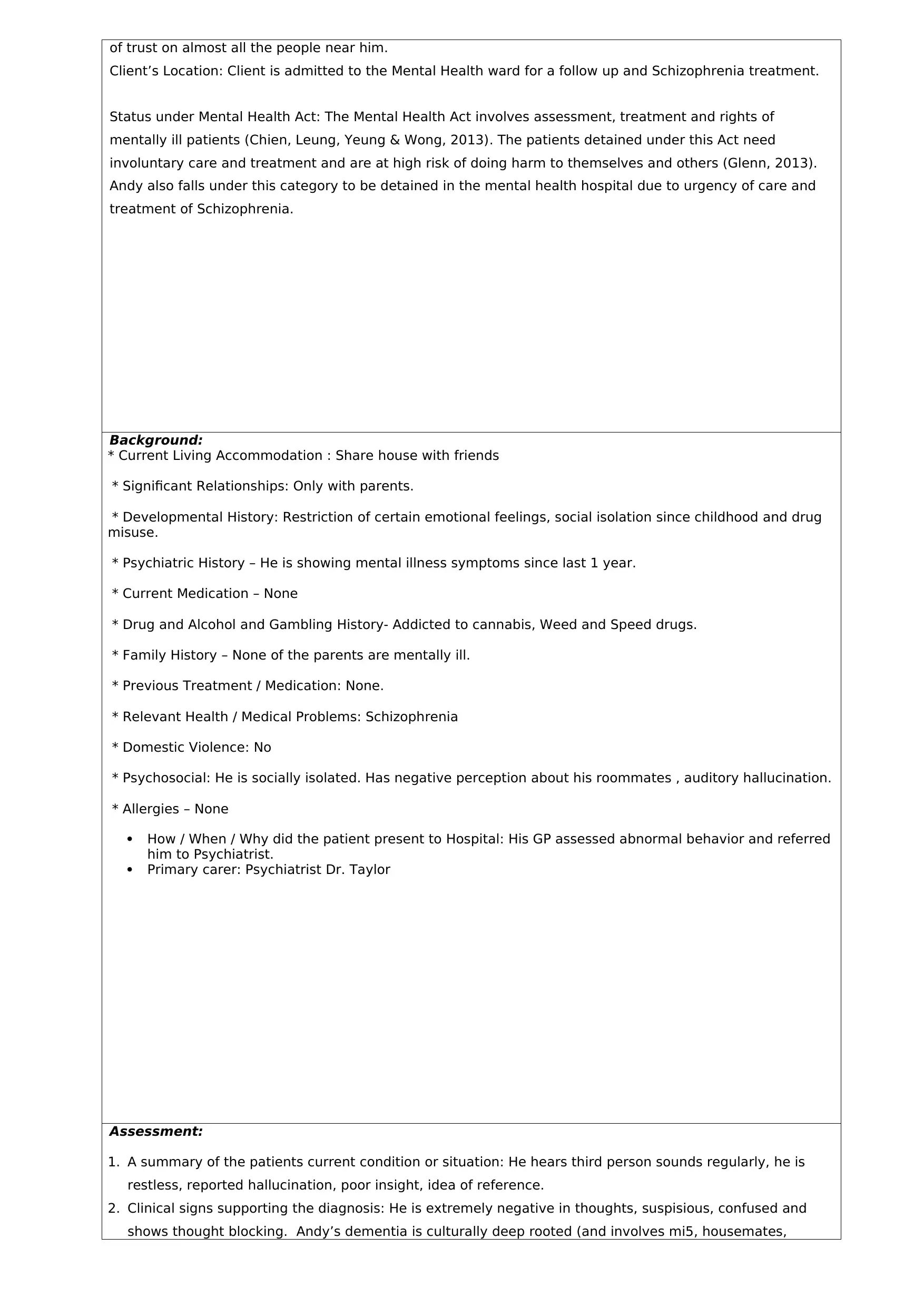
of trust on almost all the people near him.
Client’s Location: Client is admitted to the Mental Health ward for a follow up and Schizophrenia treatment.
Status under Mental Health Act: The Mental Health Act involves assessment, treatment and rights of
mentally ill patients (Chien, Leung, Yeung & Wong, 2013). The patients detained under this Act need
involuntary care and treatment and are at high risk of doing harm to themselves and others (Glenn, 2013).
Andy also falls under this category to be detained in the mental health hospital due to urgency of care and
treatment of Schizophrenia.
Background:
* Current Living Accommodation : Share house with friends
* Significant Relationships: Only with parents.
* Developmental History: Restriction of certain emotional feelings, social isolation since childhood and drug
misuse.
* Psychiatric History – He is showing mental illness symptoms since last 1 year.
* Current Medication – None
* Drug and Alcohol and Gambling History- Addicted to cannabis, Weed and Speed drugs.
* Family History – None of the parents are mentally ill.
* Previous Treatment / Medication: None.
* Relevant Health / Medical Problems: Schizophrenia
* Domestic Violence: No
* Psychosocial: He is socially isolated. Has negative perception about his roommates , auditory hallucination.
* Allergies – None
How / When / Why did the patient present to Hospital: His GP assessed abnormal behavior and referred
him to Psychiatrist.
Primary carer: Psychiatrist Dr. Taylor
Assessment:
1. A summary of the patients current condition or situation: He hears third person sounds regularly, he is
restless, reported hallucination, poor insight, idea of reference.
2. Clinical signs supporting the diagnosis: He is extremely negative in thoughts, suspisious, confused and
shows thought blocking. Andy’s dementia is culturally deep rooted (and involves mi5, housemates,
Client’s Location: Client is admitted to the Mental Health ward for a follow up and Schizophrenia treatment.
Status under Mental Health Act: The Mental Health Act involves assessment, treatment and rights of
mentally ill patients (Chien, Leung, Yeung & Wong, 2013). The patients detained under this Act need
involuntary care and treatment and are at high risk of doing harm to themselves and others (Glenn, 2013).
Andy also falls under this category to be detained in the mental health hospital due to urgency of care and
treatment of Schizophrenia.
Background:
* Current Living Accommodation : Share house with friends
* Significant Relationships: Only with parents.
* Developmental History: Restriction of certain emotional feelings, social isolation since childhood and drug
misuse.
* Psychiatric History – He is showing mental illness symptoms since last 1 year.
* Current Medication – None
* Drug and Alcohol and Gambling History- Addicted to cannabis, Weed and Speed drugs.
* Family History – None of the parents are mentally ill.
* Previous Treatment / Medication: None.
* Relevant Health / Medical Problems: Schizophrenia
* Domestic Violence: No
* Psychosocial: He is socially isolated. Has negative perception about his roommates , auditory hallucination.
* Allergies – None
How / When / Why did the patient present to Hospital: His GP assessed abnormal behavior and referred
him to Psychiatrist.
Primary carer: Psychiatrist Dr. Taylor
Assessment:
1. A summary of the patients current condition or situation: He hears third person sounds regularly, he is
restless, reported hallucination, poor insight, idea of reference.
2. Clinical signs supporting the diagnosis: He is extremely negative in thoughts, suspisious, confused and
shows thought blocking. Andy’s dementia is culturally deep rooted (and involves mi5, housemates,
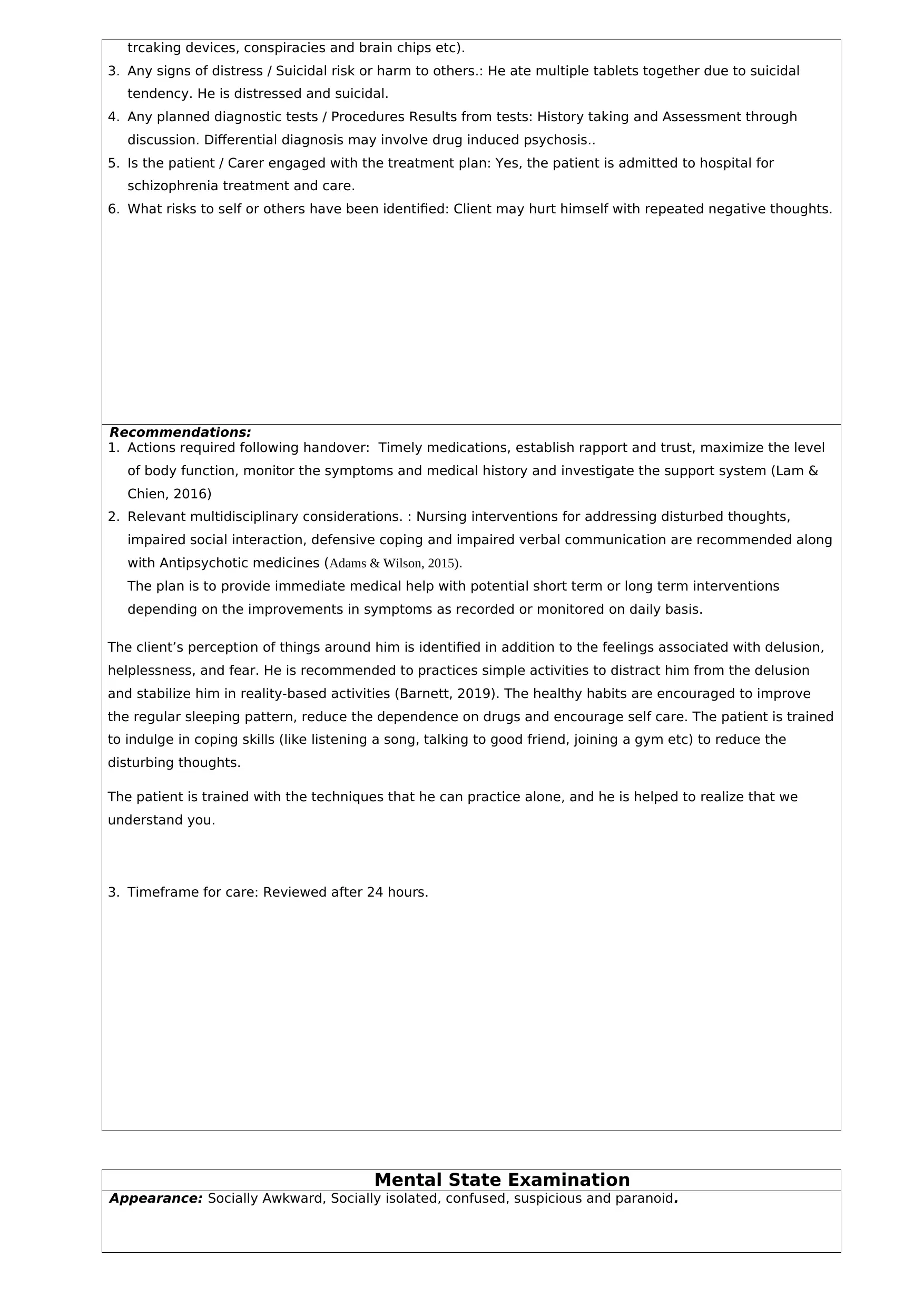
trcaking devices, conspiracies and brain chips etc).
3. Any signs of distress / Suicidal risk or harm to others.: He ate multiple tablets together due to suicidal
tendency. He is distressed and suicidal.
4. Any planned diagnostic tests / Procedures Results from tests: History taking and Assessment through
discussion. Differential diagnosis may involve drug induced psychosis..
5. Is the patient / Carer engaged with the treatment plan: Yes, the patient is admitted to hospital for
schizophrenia treatment and care.
6. What risks to self or others have been identified: Client may hurt himself with repeated negative thoughts.
Recommendations:
1. Actions required following handover: Timely medications, establish rapport and trust, maximize the level
of body function, monitor the symptoms and medical history and investigate the support system (Lam &
Chien, 2016)
2. Relevant multidisciplinary considerations. : Nursing interventions for addressing disturbed thoughts,
impaired social interaction, defensive coping and impaired verbal communication are recommended along
with Antipsychotic medicines (Adams & Wilson, 2015).
The plan is to provide immediate medical help with potential short term or long term interventions
depending on the improvements in symptoms as recorded or monitored on daily basis.
The client’s perception of things around him is identified in addition to the feelings associated with delusion,
helplessness, and fear. He is recommended to practices simple activities to distract him from the delusion
and stabilize him in reality-based activities (Barnett, 2019). The healthy habits are encouraged to improve
the regular sleeping pattern, reduce the dependence on drugs and encourage self care. The patient is trained
to indulge in coping skills (like listening a song, talking to good friend, joining a gym etc) to reduce the
disturbing thoughts.
The patient is trained with the techniques that he can practice alone, and he is helped to realize that we
understand you.
3. Timeframe for care: Reviewed after 24 hours.
Mental State Examination
Appearance: Socially Awkward, Socially isolated, confused, suspicious and paranoid.
3. Any signs of distress / Suicidal risk or harm to others.: He ate multiple tablets together due to suicidal
tendency. He is distressed and suicidal.
4. Any planned diagnostic tests / Procedures Results from tests: History taking and Assessment through
discussion. Differential diagnosis may involve drug induced psychosis..
5. Is the patient / Carer engaged with the treatment plan: Yes, the patient is admitted to hospital for
schizophrenia treatment and care.
6. What risks to self or others have been identified: Client may hurt himself with repeated negative thoughts.
Recommendations:
1. Actions required following handover: Timely medications, establish rapport and trust, maximize the level
of body function, monitor the symptoms and medical history and investigate the support system (Lam &
Chien, 2016)
2. Relevant multidisciplinary considerations. : Nursing interventions for addressing disturbed thoughts,
impaired social interaction, defensive coping and impaired verbal communication are recommended along
with Antipsychotic medicines (Adams & Wilson, 2015).
The plan is to provide immediate medical help with potential short term or long term interventions
depending on the improvements in symptoms as recorded or monitored on daily basis.
The client’s perception of things around him is identified in addition to the feelings associated with delusion,
helplessness, and fear. He is recommended to practices simple activities to distract him from the delusion
and stabilize him in reality-based activities (Barnett, 2019). The healthy habits are encouraged to improve
the regular sleeping pattern, reduce the dependence on drugs and encourage self care. The patient is trained
to indulge in coping skills (like listening a song, talking to good friend, joining a gym etc) to reduce the
disturbing thoughts.
The patient is trained with the techniques that he can practice alone, and he is helped to realize that we
understand you.
3. Timeframe for care: Reviewed after 24 hours.
Mental State Examination
Appearance: Socially Awkward, Socially isolated, confused, suspicious and paranoid.
⊘ This is a preview!⊘
Do you want full access?
Subscribe today to unlock all pages.

Trusted by 1+ million students worldwide
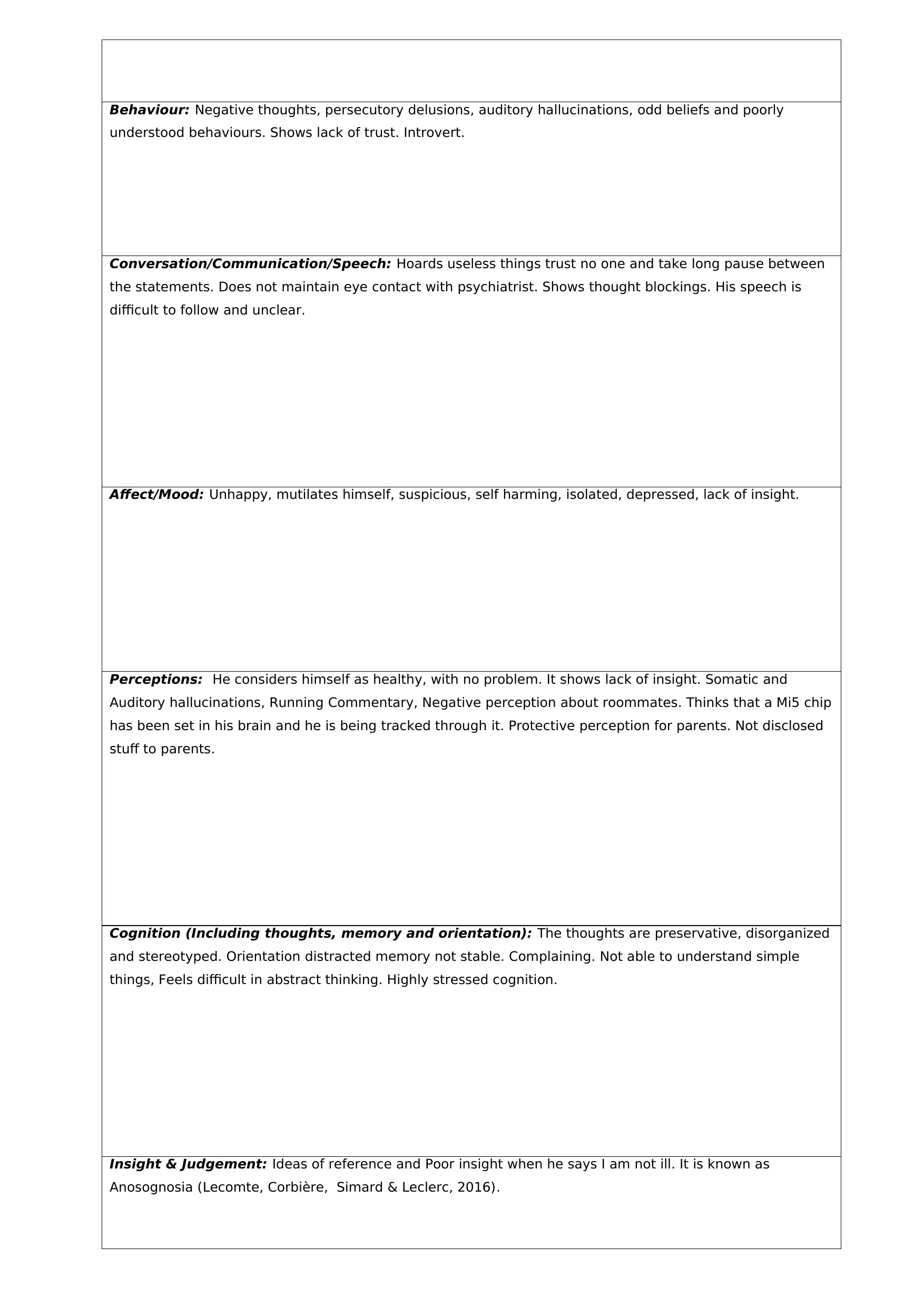
Behaviour: Negative thoughts, persecutory delusions, auditory hallucinations, odd beliefs and poorly
understood behaviours. Shows lack of trust. Introvert.
Conversation/Communication/Speech: Hoards useless things trust no one and take long pause between
the statements. Does not maintain eye contact with psychiatrist. Shows thought blockings. His speech is
difficult to follow and unclear.
Affect/Mood: Unhappy, mutilates himself, suspicious, self harming, isolated, depressed, lack of insight.
Perceptions: He considers himself as healthy, with no problem. It shows lack of insight. Somatic and
Auditory hallucinations, Running Commentary, Negative perception about roommates. Thinks that a Mi5 chip
has been set in his brain and he is being tracked through it. Protective perception for parents. Not disclosed
stuff to parents.
Cognition (Including thoughts, memory and orientation): The thoughts are preservative, disorganized
and stereotyped. Orientation distracted memory not stable. Complaining. Not able to understand simple
things, Feels difficult in abstract thinking. Highly stressed cognition.
Insight & Judgement: Ideas of reference and Poor insight when he says I am not ill. It is known as
Anosognosia (Lecomte, Corbière, Simard & Leclerc, 2016).
understood behaviours. Shows lack of trust. Introvert.
Conversation/Communication/Speech: Hoards useless things trust no one and take long pause between
the statements. Does not maintain eye contact with psychiatrist. Shows thought blockings. His speech is
difficult to follow and unclear.
Affect/Mood: Unhappy, mutilates himself, suspicious, self harming, isolated, depressed, lack of insight.
Perceptions: He considers himself as healthy, with no problem. It shows lack of insight. Somatic and
Auditory hallucinations, Running Commentary, Negative perception about roommates. Thinks that a Mi5 chip
has been set in his brain and he is being tracked through it. Protective perception for parents. Not disclosed
stuff to parents.
Cognition (Including thoughts, memory and orientation): The thoughts are preservative, disorganized
and stereotyped. Orientation distracted memory not stable. Complaining. Not able to understand simple
things, Feels difficult in abstract thinking. Highly stressed cognition.
Insight & Judgement: Ideas of reference and Poor insight when he says I am not ill. It is known as
Anosognosia (Lecomte, Corbière, Simard & Leclerc, 2016).
Paraphrase This Document
Need a fresh take? Get an instant paraphrase of this document with our AI Paraphraser
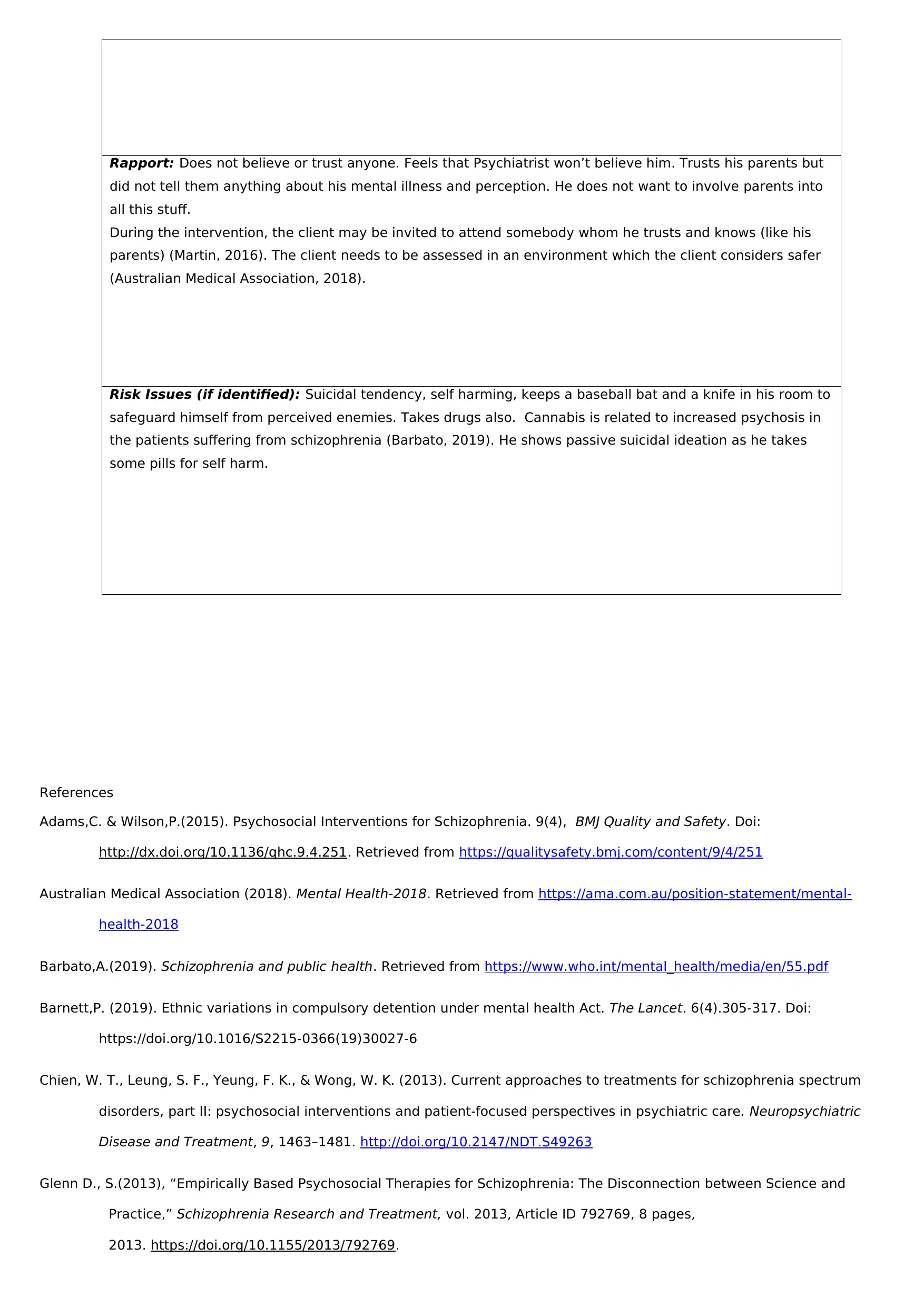
Rapport: Does not believe or trust anyone. Feels that Psychiatrist won’t believe him. Trusts his parents but
did not tell them anything about his mental illness and perception. He does not want to involve parents into
all this stuff.
During the intervention, the client may be invited to attend somebody whom he trusts and knows (like his
parents) (Martin, 2016). The client needs to be assessed in an environment which the client considers safer
(Australian Medical Association, 2018).
Risk Issues (if identified): Suicidal tendency, self harming, keeps a baseball bat and a knife in his room to
safeguard himself from perceived enemies. Takes drugs also. Cannabis is related to increased psychosis in
the patients suffering from schizophrenia (Barbato, 2019). He shows passive suicidal ideation as he takes
some pills for self harm.
References
Adams,C. & Wilson,P.(2015). Psychosocial Interventions for Schizophrenia. 9(4), BMJ Quality and Safety. Doi:
http://dx.doi.org/10.1136/qhc.9.4.251. Retrieved from https://qualitysafety.bmj.com/content/9/4/251
Australian Medical Association (2018). Mental Health-2018. Retrieved from https://ama.com.au/position-statement/mental-
health-2018
Barbato,A.(2019). Schizophrenia and public health. Retrieved from https://www.who.int/mental_health/media/en/55.pdf
Barnett,P. (2019). Ethnic variations in compulsory detention under mental health Act. The Lancet. 6(4).305-317. Doi:
https://doi.org/10.1016/S2215-0366(19)30027-6
Chien, W. T., Leung, S. F., Yeung, F. K., & Wong, W. K. (2013). Current approaches to treatments for schizophrenia spectrum
disorders, part II: psychosocial interventions and patient-focused perspectives in psychiatric care. Neuropsychiatric
Disease and Treatment, 9, 1463–1481. http://doi.org/10.2147/NDT.S49263
Glenn D., S.(2013), “Empirically Based Psychosocial Therapies for Schizophrenia: The Disconnection between Science and
Practice,” Schizophrenia Research and Treatment, vol. 2013, Article ID 792769, 8 pages,
2013. https://doi.org/10.1155/2013/792769.
did not tell them anything about his mental illness and perception. He does not want to involve parents into
all this stuff.
During the intervention, the client may be invited to attend somebody whom he trusts and knows (like his
parents) (Martin, 2016). The client needs to be assessed in an environment which the client considers safer
(Australian Medical Association, 2018).
Risk Issues (if identified): Suicidal tendency, self harming, keeps a baseball bat and a knife in his room to
safeguard himself from perceived enemies. Takes drugs also. Cannabis is related to increased psychosis in
the patients suffering from schizophrenia (Barbato, 2019). He shows passive suicidal ideation as he takes
some pills for self harm.
References
Adams,C. & Wilson,P.(2015). Psychosocial Interventions for Schizophrenia. 9(4), BMJ Quality and Safety. Doi:
http://dx.doi.org/10.1136/qhc.9.4.251. Retrieved from https://qualitysafety.bmj.com/content/9/4/251
Australian Medical Association (2018). Mental Health-2018. Retrieved from https://ama.com.au/position-statement/mental-
health-2018
Barbato,A.(2019). Schizophrenia and public health. Retrieved from https://www.who.int/mental_health/media/en/55.pdf
Barnett,P. (2019). Ethnic variations in compulsory detention under mental health Act. The Lancet. 6(4).305-317. Doi:
https://doi.org/10.1016/S2215-0366(19)30027-6
Chien, W. T., Leung, S. F., Yeung, F. K., & Wong, W. K. (2013). Current approaches to treatments for schizophrenia spectrum
disorders, part II: psychosocial interventions and patient-focused perspectives in psychiatric care. Neuropsychiatric
Disease and Treatment, 9, 1463–1481. http://doi.org/10.2147/NDT.S49263
Glenn D., S.(2013), “Empirically Based Psychosocial Therapies for Schizophrenia: The Disconnection between Science and
Practice,” Schizophrenia Research and Treatment, vol. 2013, Article ID 792769, 8 pages,
2013. https://doi.org/10.1155/2013/792769.

Lam,A., & Chien.,W (2016). The effectiveness of mindfulness-based intervention for people with schizophrenia: a systematic
review. 10.4172/Neuropsychiatry.1000142. Retrieved from http://www.jneuropsychiatry.org/peer-review/the-
effectiveness-of-mindfulnessbased-intervention-for-people-with-schizophrenia-a-systematic-review.pdf
Lecomte, T., Corbière, M., Simard, S., & Leclerc, C. (2014). Merging Evidence-Based Psychosocial Interventions in
Schizophrenia. Behavioral Sciences, 4(4), 437–447. http://doi.org/10.3390/bs4040437
Martin,P.(2016). 6 Schizophrenia Nursing Care Plans. Retrieved from https://nurseslabs.com/schizophrenia-nursing-care-plans/
review. 10.4172/Neuropsychiatry.1000142. Retrieved from http://www.jneuropsychiatry.org/peer-review/the-
effectiveness-of-mindfulnessbased-intervention-for-people-with-schizophrenia-a-systematic-review.pdf
Lecomte, T., Corbière, M., Simard, S., & Leclerc, C. (2014). Merging Evidence-Based Psychosocial Interventions in
Schizophrenia. Behavioral Sciences, 4(4), 437–447. http://doi.org/10.3390/bs4040437
Martin,P.(2016). 6 Schizophrenia Nursing Care Plans. Retrieved from https://nurseslabs.com/schizophrenia-nursing-care-plans/
⊘ This is a preview!⊘
Do you want full access?
Subscribe today to unlock all pages.

Trusted by 1+ million students worldwide
1 out of 6